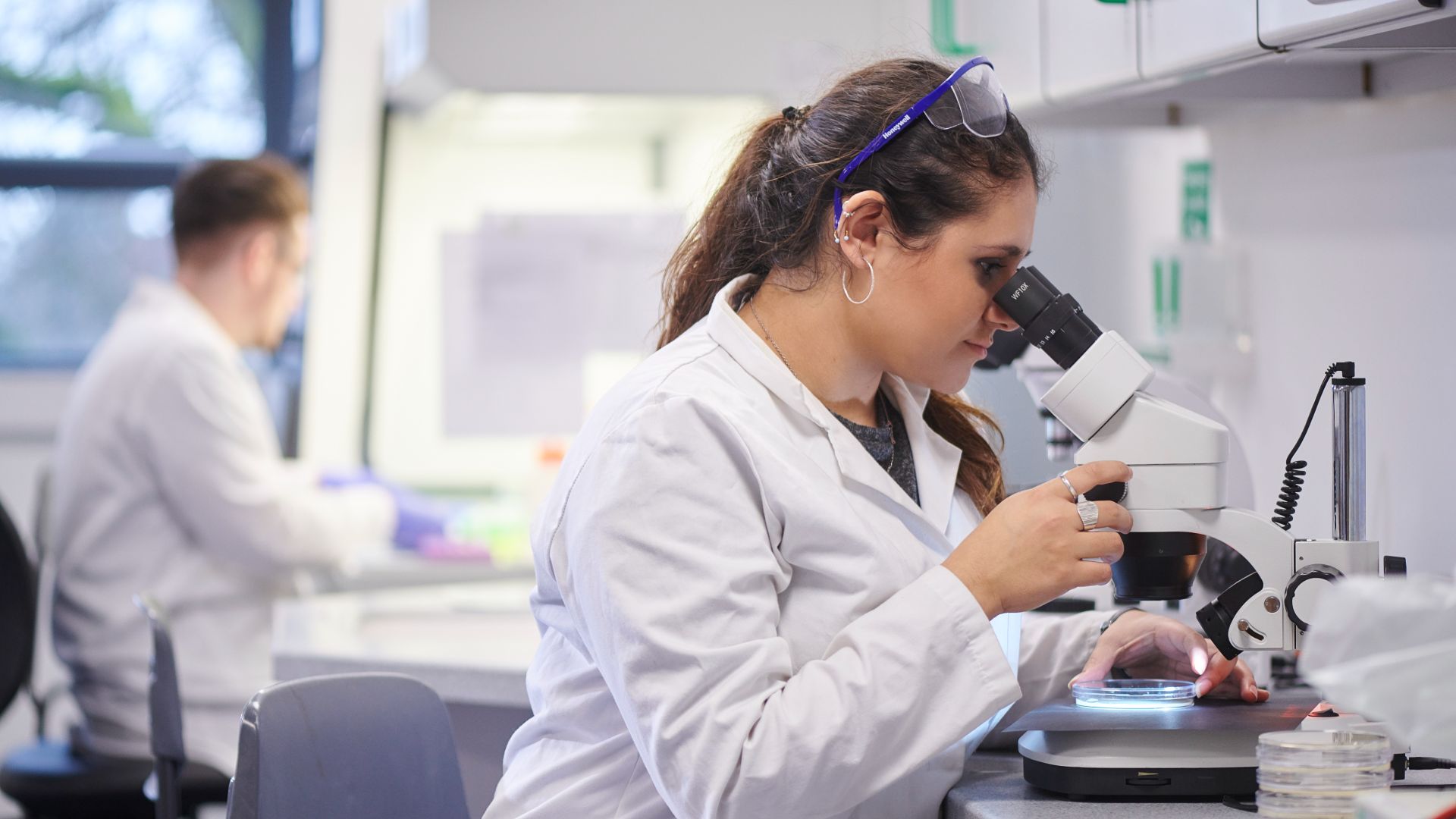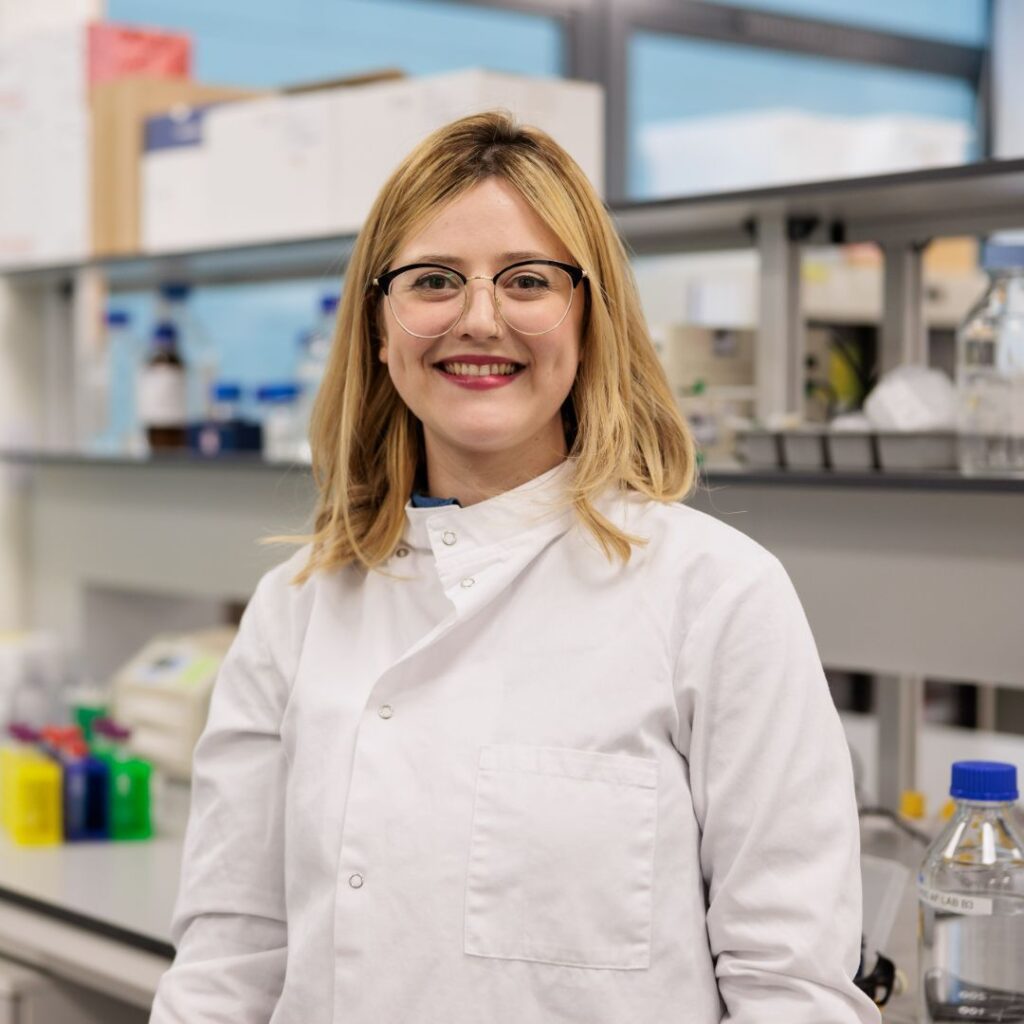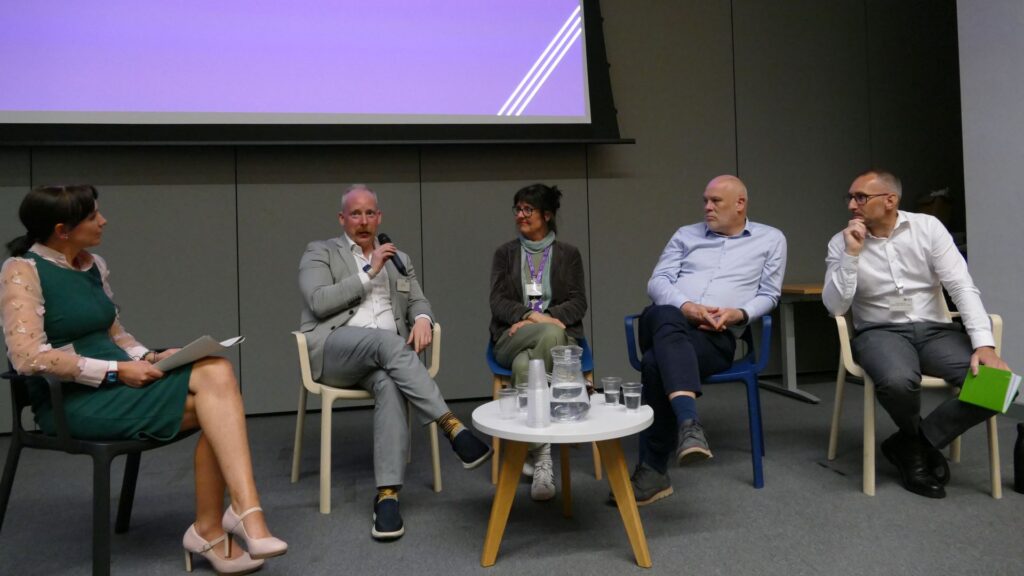
“Whether it’s through the development of next-generation diagnostic tools, the advancement of personalised medicine, or the exploration of innovative strategies to combat infectious diseases, this field plays a pivotal role in shaping the future of medicine. Without biomedical science, many of the pioneering technologies and life-saving treatments available today would not exist.”
Amanda Thomaz
Lecturer Amanda Thomaz speaks to us about her journey into biomedical science, the importance of the field, and how you can uncover the ‘cure-iosities’ of biomedical science at Edge Hill.

Tell us a little bit about yourself, your journey into biomedical science, and your current research.
Early interests
I have always been a curious person, especially when it comes to biology and understanding how the human body functions. My interest in biomedical science began with a fascination for genetics, the underlying mechanisms of disease and how small cellular changes can have profound effects. As a cancer biologist, I am particularly drawn to studying how normal cells transform into cancerous ones and how we can develop targeted therapies to eliminate malignant cells. Understanding these processes is like solving a complex puzzle, with each discovery bringing us closer to more effective treatments. More than anything, I am driven by the potential to contribute to scientific advancements that could make a real difference for those affected by cancer, a disease that touches so many lives.
Academic journey
My academic journey has been shaped by a deep commitment to advancing cancer research, particularly in the pursuit of novel therapeutic targets. This path began with my undergraduate studies in Pharmacy, followed by a Masters degree in Medical Sciences and a PhD in Cellular and Molecular Biology. My research has primarily focused on paediatric and adult brain tumours and triple-negative breast cancer, which present complex biological challenges due to a lack of effective treatments.
Despite significant scientific advancements, brain tumours remain among the most lethal cancers, with little improvement in survival rates over the past three decades. This reality has further fuelled my dedication to research excellence and the pursuit of meaningful breakthroughs. Seeking the best opportunities to expand my expertise, I have engaged in international research collaborations aimed at understanding the molecular mechanisms driving cancer progression and therapy resistance.
Current research
My laboratory research is currently focused on understanding the molecular mechanisms driving cancer progression and therapy resistance, with an emphasis on cancer neurobiology and targeted protein degradation as a novel therapeutic strategy. I have been fortunate to work on several exciting collaborative projects. One of the most recent discoveries involved targeting breast cancer cells with abnormal centrosome numbers. By integrating cutting-edge technologies and collaborating across disciplines, I am committed to advancing cancer research and translating these discoveries into more effective, targeted therapies that could improve patient outcomes.
So, why is biomedical science important and how can this be explored at Edge Hill University?
The importance of biomedical science
At its core, biomedical science is the study of how the human body functions, the mechanisms underlying disease, and the application of this knowledge to improve healthcare. It is the driving force behind medical advancements that have a transformative impact on human health. Whether through the development of next-generation diagnostic tools, the advancement of personalised medicine, or the exploration of innovative strategies to combat infectious diseases, this field plays a pivotal role in shaping the future of medicine. Without biomedical science, many of the pioneering technologies and life-saving treatments available today would not exist.
The biomedical science degree at Edge Hill
Our BSc (Hons) Biomedical Science degree at Edge Hill University offers a comprehensive and flexible curriculum, equipping you with the theoretical knowledge, practical skills, and research experience necessary for a career in biomedical sciences. The programme covers a wide range of disciplines, including cell biology, genetics, microbiology, immunology, molecular biology, and biochemistry, ensuring you gain a well-rounded understanding of human health and disease. Beyond the classroom, you’ll have the chance to engage with industry professionals, attend guest lectures, and participate in networking events. The programme also provides opportunities for work placements, enabling you to gain valuable real-world experience. If you’re interested in expanding your horizons, there are study abroad opportunities, allowing you to experience global healthcare systems and biomedical research environments. By the time you graduate, you will have developed a diverse skill set, strong research experience, and a clear pathway to careers in biomedical science, healthcare, or further postgraduate study.
What are the benefits?
Career-enhancing opportunities
This degree offers a highly flexible, engaging, and career-focused education, preparing you for success in a rapidly evolving field. One of the standout features of the biomedical science degree at Edge Hill is its flexibility in module choices which allow you to tailor your studies to align with your career aspirations. As a result, you’ll graduate with a unique skill set that will enhance your employability in various biomedical fields. Edge Hill is renowned for its student-centred approach to education, offering small class sizes, individualised academic support, and hands-on learning experiences. This ensures that you’ll receive high-quality teaching in a supportive and dynamic environment. Whether you aspire to work in medical research, diagnostics, pharmaceuticals, or healthcare innovation, you’ll be equipped with the knowledge, skills, and practical experience needed to thrive in the field of biomedical sciences.
The facilities
Our Biosciences and Tech Hub laboratories, along with our brand-new Life Sciences facility, provide state-of-the-art teaching and research spaces, offering you hands-on experience with advanced scientific techniques. These laboratories are equipped with Class 1 and Class 2 microbial and human cell culture facilities, as well as specialised technology, including gene sequencing machines, histology and molecular biology workspaces, and flow cytometry equipment.
A key highlight is the JEOL Imaging Centre, which houses high-resolution scanning and transmission electron microscopes, allowing students and researchers to explore biological structures in extraordinary detail. Additionally, the laboratories feature light and fluorescent microscopes, essential tools frequently used by students for dissertation research projects.
By providing access to cutting-edge technology and practical experience, we ensure that you are well-prepared for careers in biomedical science, research, and beyond.
What career options does a degree in biomedical science provide?
Future careers
Studying biomedical science will develop you with a diverse set of critical thinking and transferable skills that are highly valued across various sectors. The expertise of a biomedical scientist extends beyond laboratory research and data analysis to areas such as disease investigation, the development of new treatments, clinical trials, healthcare policy, safety regulation, and more. Career opportunities for biomedical scientists are vast and varied. You could work in hospitals and clinical laboratories (both NHS and private), pharmaceutical and biotechnology companies, the medical device industry, forensic science, research institutions, universities, and the education sector. Or you may play a crucial role in government and public health agencies, shaping policies that safeguard public health. A degree in biomedical science opens doors to a dynamic and impactful career, where scientific discovery meets real-world application, contributing to the advancement of medicine and healthcare.
Watch the video below to hear from student Amadee, who discusses what it’s like to study on the BSc (Hons) Biomedical Science degree.
March 3, 2025


